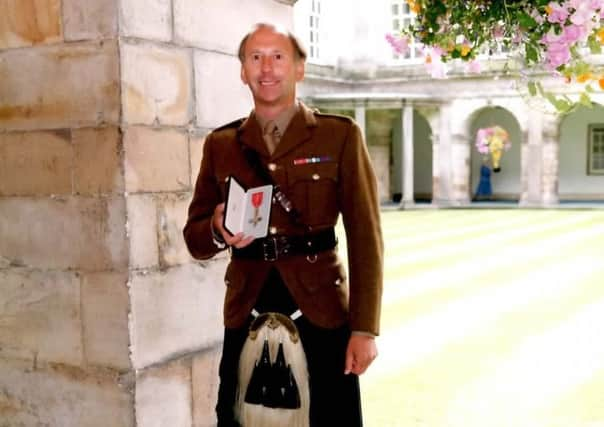Obituary: Major Selby Charles Macduff-Duncan, soldier


He used to joke that he had served from Far East to Far West: from Hong Kong to Canada, and all points in between. And that wasn’t far off the mark for Selby Macduff -Duncan, a career soldier with a proud military pedigree.
His father and great grandfather had served with the Black Watch and there was a family heritage of army service dating back to the 18th century. He even owed his name to an army doctor, W Selby Tulloch, who virtually brought his father, Major Hector Macduff-Duncan, back from the dead on the battlefield.
Advertisement
Hide AdAdvertisement
Hide AdSelby was born in the Scottish capital and raised on his parents’ farm in the Black Isle. Educated at Conon Bridge Primary, Cargilfield Preparatory School, Edinburgh and Fort Augustus Abbey School, he failed to sparkle academically but his father had high hopes that his son would serve with his old regiment. He took him to the Inverness recruiting office and the teenager signed up with the army.
He then trained at Glencorse Barracks at Penicuik and served as a private and lance corporal in the Gordon Highlanders, including a tour in Cyprus, before gaining the extra academic qualification required for admittance to the Royal Military Academy Sandhurst. He completed his officer training in 1973 and received a Special Regular Commission into the 1st Battalion The Black Watch.
His early career included short tours to Hong Kong, Singapore and to Malaysia for a diving expedition. An active sportsman and keen sailor and diver, he was one of the first in the country to take up windsurfing and was an instructor in both windsurfing and sailing. He also skied for the Black Watch and for the army in Scotland and curled for his regiment and the Highland and Lowland Brigades Club.
In the mid-1970s he led the Infantry Junior Leaders course at Shorncliffe, Folkstone and moved with the regiment to Catterick soon after marrying his first wife, Moira, in 1977.The following year he had the honour of carrying the old Queen’s Colours through Perth Balhousie Castle, where they were laid up.
After promotion to captain, in 1979, he was posted to Belize, where his duties included running the force Adventure Training Centre. After returning to Catterick the regiment moved to Werl in West Germany but he was soon sent to Canada as Mortar Safety Officer at the British Army Training Unit at Suffield near Calgary.
By1981 and his return to Scotland, he was adjutant of 1/51 Highland Volunteers, an association that lasted for more than a decade. Two years later he moved to Wales and he was promoted to major in 1985. That same year he rejoined his regiment as commander of HQ company during a tour in Northern Ireland, his own experiences as a soldier giving him an insight not possessed by other commanders.
Macduff-Duncan, who was nicknamed “Mad Macduff”, was no stranger to the Republicans in Northern Ireland and, during the sale of his family home in Crieff, received an unscheduled visit from a man with a strong Ulster accent but no appointment to view. The caller asked to see inside the property but was not allowed in. He was later traced and arrested, but the consequences are unknown.
After returning from Armagh to Edinburgh’s Redford Barracks, Macduff-Duncan assisted at the 1986 Commonwealth Games and went to Berlin the following year, before being posted to Zimbabwe, in 1988, attached to the British Military Advisory and Training Team.
Advertisement
Hide AdAdvertisement
Hide AdThat autumn he was back in Scotland again as deputy chief of staff to HQ 51 Highland Brigade and later training major of 1/51 Highland. He was also band president of 51 Highland’s Military Band, a member of various local clubs and societies where he lived in Perthshire and he gained his private pilot’s licence.
In 1993 when severe flooding hit Perth he was involved in the response to help the thousands of stricken residents. The incident caused millions of pounds worth of damage to city and a major operation was set up to handle the crisis. Macduff-Duncan was based at the council’s emergency control room and he briefed government ministers and Princess Alexandra, who visited the area, on the assistance of the Territorial Army.
The next couple of years saw him posted to the army’s HQ in Scotland at Craigiehall, Edinburgh, where he was involved with the Military Tattoo. He received a military MBE for organising the commemoration events in Edinburgh in 1995 for the 50th anniversaries of VE and VJ Days. But the active soldier had been “fighting a desk”, as he put it, for too long and volunteered for Operation Provide Comfort, a UN initiative in the aftermath of the first Gulf War to protect the Kurds in northern Iraq and southern Turkey. Posted to the Military Co-ordination Centre at Zakho, Iraq, he was promoted temporarily to lieutenant colonel to satisfy the Americans who would reportedly deal with no-one below that rank.
Back in Scotland to a desk job in Edinburgh, and by now divorced from his first wife, he married his second wife Kate at St Margaret’s Chapel, Edinburgh Castle. They left for Oman in 1999 where he had an advisory position at the Officer Training facility at Salalah. Four years later they moved to his last overseas post, as second-in-command of the Royal Gibraltar Regiment, before going to Lossiemouth where he was ground liaison officer with 14 Squadron, RAF. He retired from the army in 2007.
In civilian life he lived on Deeside and was a project manager at Fasque and Glendye estates, overseeing the renovation of properties from cottages to Balbegno Castle.
Strong, active and dynamic, almost to the end, he only recently qualified as a Duke of Edinburgh instructor.
He is survived by his wife, their daughter Alice and the children of his first marriage, Robert and Julia.
ALISON SHAW